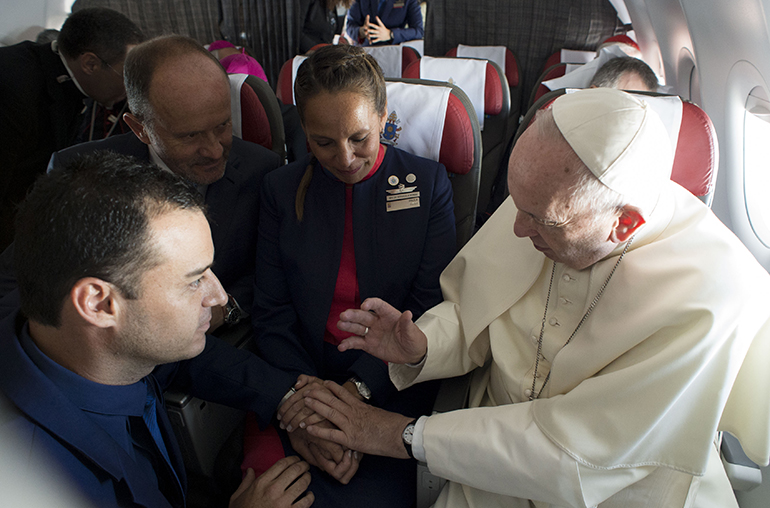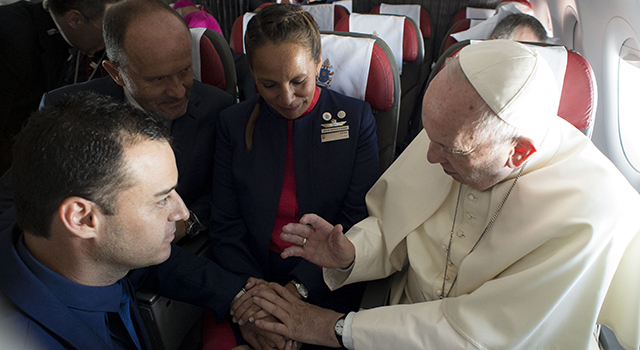By Father Luis A. Rivero - Archdiocese of Miami

Photographer: Vatican Media/CNA
Pope Francis marries flight attendants Paula Podesta and Carlos Ciuffardi during his flight from Santiago to Iquique Jan. 18, 2018.
Editor’s note: Father Luis Rivero is a judge in Miami’s Metropolitan Tribunal and administrator of St. Jerome Parish in Fort Lauderdale.
This past week, Pope Francis witnessed the marriage of Paula Podesta and Carlos Ciuffardi aboard a papal flight between cities in Chile. While this event caused joy among many of the Catholic faithful throughout the world, it has also caused some concern. Allow me to shed a ray of light on the issue from a canonical perspective.
Yet before doing so, it is only fitting that I quote the great Msgr. Roch Pagé, my first professor of canon law at The Catholic University of America. As this gregarious then 76-year-old often repeated: “The diocesan bishop can do whatever he wants to do � as long as he knows what he is doing.”
These words, sound and accurate from a canonical perspective, are very much applicable to the most recent pontifical act. Pope Francis is the Bishop of Rome and hence the first among equals (1983 Code of Canon Law, 331). He is the one who sits on the Chair of Peter, the successor of the one to whom Our Lord entrusted the Church (Matt 16:18). Furthermore, the Roman Pontiff is the universal legislator for all ecclesiastical laws.
You see how complex this situation has become? It is not as “black and white” as some think. Therefore the events that took place aboard that now famous papal flight ought to be seen and treated as an onion: an issue with many layers that make up the whole. With that in mind, allow me to walk you, dear reader, through a crash course on the Code of Canon Law (hereafter Code, abbreviated as c.).
First, we must understand that the Code only applies to baptized Latin Rite Catholics (c. 1, c. 11) Furthermore, the Code contains both divine/natural law and ecclesiastical (Church) law. Divine law can never be tampered with; for example, there are seven sacraments because their roots are in Scripture, namely through Christ. Second, ecclesiastical laws are disciplinary, promulgated for the good order and well-being of the souls bound by the law. These are in place also to safeguard divine laws.
Ecclesiastical laws can be further divided into two: universal or particular (c. 8, ��1-2). The Roman Pontiff is the legislator for universal law. Diocesan bishops are the legislators for particular laws within their territory, that is the dioceses where they serve as bishops. Neither of these laws � ecclesiastical or particular � can ever go against or contradict divine law. Furthermore, a particular law can never contradict a universal law. (Similar to our U.S. system of constitutional, federal and state laws.)
No one, not even the pope, can tamper with divine law. But we can obtain dispensation from ecclesiastical laws. A dispensation is a relaxation of a merely ecclesiastical law by the competent authority.
One illustration: A diocesan bishop has promulgated a particular law which binds all those in his diocese, as well as visitors, to celebrate the sacrament of marriage in a church or chapel. This is the particular law. A Catholic wedding cannot be witnessed by a cleric in any other place within that diocese or he would incur a penalty. But let’s say someone is in the hospital, terminally ill, and Father Holy Priest visits the family. The couple have always wanted to get married by the Church, but after years of ill health, they have been unable to fulfill all the marriage requirements. Father Holy Priest knows he can call the competent authority � the bishop or anyone to whom he has delegated that authority � and that person can dispense the couple from the particular law and witness their marriage in the hospital. Something similar occurred recently with the ordination of a priest.
What if Father Holy Priest happens to have the pope’s phone number and calls him? Can the pope be considered that competent authority? Yes. “By virtue of his office [as Roman Pontiff] he possesses supreme, full, immediate, and universal ordinary power in the Church, which he is always able to exercise freely” (c. 331).
Now let me peel off another layer of this onion: the canonical form of marriage. The first canon in the Code that speaks of marriage is much more than a canon; it is a creedal statement which defines the sacrament of marriage (c. 1055 �1-2). Canon 1057 states: “The consent of the parties, legitimately manifested between persons qualified by law, makes marriage; no human power is able to supply this consent. Matrimonial consent is an act of the will by which man and woman mutually give and accept each other through an irrevocable covenant in order to establish marriage.”
So what is the actual canonical form? The canonical form of marriage, which all baptized Latin Catholics are bound to follow, is found in Canon 1108 �1: “Only those marriages are valid which are contracted before the local ordinary, pastor, or a priest or deacon delegated by either of them, who assist, and before two witnesses [�] without prejudice to the exceptions mentioned in [�] cann. [�]1127, ��1-2.”
In other words, for the canonical form of marriage to take place you need: the contracting parties (a man and a woman free to marry), a member of the clergy and two witnesses.
And what are those exceptions? According to c. 1127 �2: “If grave difficulties hinder the observance of canonical form, the local ordinary [�] has the right of dispensing from the form in individual cases [�]”
Hopefully you are beginning to see everything come together now.
The sacrament of marriage contains both divine law and ecclesiastical law:
� Divine: It is a sacrament elevated by Christ, and it must be between a man and a woman;
� Ecclesiastical: the preparation, the place, in front of a cleric, two witnesses, etc.
Therefore, what Pope Francis did in mid-flight is 100 percent canonically kosher � to borrow a word from our “elder brothers and sisters” in the faith.


Comments from readers